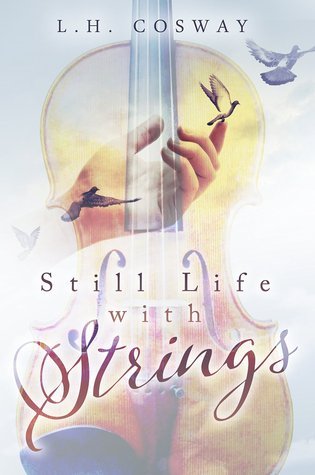 Review policy: I only post reviews on my blog for books I feel strongly about, good or bad.
Review policy: I only post reviews on my blog for books I feel strongly about, good or bad.
Title: STILL LIFE WITH STRINGS
Author: L.H. Cosway Read more
Never underestimate the commercial value of mental illness.

 Review policy: I only post reviews on my blog for books I feel strongly about, good or bad.
Review policy: I only post reviews on my blog for books I feel strongly about, good or bad.
Title: STILL LIFE WITH STRINGS
Author: L.H. Cosway Read more
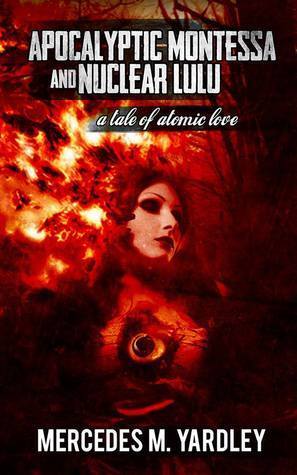 Title: APOCALYPTIC MONTESSA AND NUCLEAR LULU: A TALE OF ATOMIC LOVE
Title: APOCALYPTIC MONTESSA AND NUCLEAR LULU: A TALE OF ATOMIC LOVE
Mercedes M. Yardley
Published by Ragnarok Publications
Genre: Horror
Year Published: 2014
Number of Pages: 175
Format(s) Available: ebook, paperback, audiobook
Amazon Kindle ASIN: B00HWMK298
Reviewed by miztrniceguy aka Dude1
Originally posted on Amazon
burn baby, burn!
This story is very dark and twisted, but at the same time it’s a sweet love story. I was surprised at the tenderness between Lulu and Montessa. I was hoping for a different ending and was surprised by it.
This is my first book I have read by Mercedes Murdock Yardley, but won’t be the last.
______________________________
1. miztrniceguy aka Dude is the guy Moriah sleeps with. He reads a lot of books, but has only lately gotten into the reviewing game because he started hanging out with Moriah’s writerly type friends who aren’t quite as storied as Stephen King.
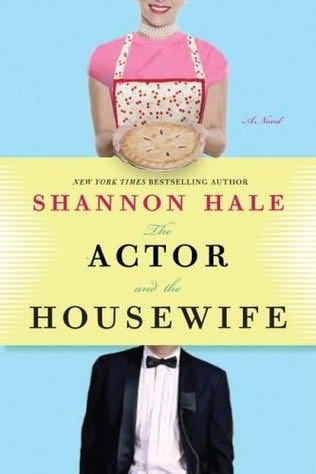 The Actor and the Housewife
The Actor and the Housewife
by Shannon Hale
Published by Bloomsbury USA
I feel like I just got jerked around in an extremely passive-aggressive manner by a narcissistic fuckwad.
I can’t tell you how pissed off I am at this moment.
No review. No more crit. You can see previous entries here and here. It’s completely irrelevant.
Tell you what. I’ll read Stephenie Meyer again before I’ll read anything else this author’s ever written. I can’t imagine Breaking Dawn is a worse betrayal by an author than this.
ETA:
I’ve gotten a bunch of emails about what actually happened, so here you go. Spoiler warning.
All the way through this book, Felix is in love with Becky. Almost painfully so. Obviously so (which is its own irritation that nobody picks up on this). He’s a very nice guy and fairly fleshed out and he’s only an ass for maybe 5 pages of the whole book.
Okay.
Her husband dies at the 2/3 mark. So, for 2/3 of the book she’s all about Felix when her husband’s around. Then, for the last 1/3, she’s all mourning her husband for two years, and Felix is there, wanting to marry her, tells her he’s been in love with her (and oh, this comes as a complete shock to her, right? Pfffttt), and now she’s all about her husband. So for pages and pages and pages and pages she’s all, “NO I’M STILL MARRIED TO MIKE!!!” (this is after 2 years of widowhood, remember) and breaking Felix’s heart, then she finally decides, yeah, okay, I can marry him. He’s my best friend after all. I’m 45 and my kids are way grown (youngest is 13 or something and oldest 2 are gone) and Felix and I can grow old together, so yeah, I think maybe I’ll think about marrying him after all.
And then they go away for a while so they can kiss uninterrupted. So they do.
And it is (I quote), “a belly-flop” of a kiss. No passion. So that’s it. They go their separate ways, I guess still being best pals on the phone or whatever.
Cuz they aren’t made for each other after all.
Because they didn’t get horny when they kissed for the first time.
Happy happy joy joy.
ARE YOU FUCKING KIDDING ME? AFTER ALL THAT FUCKING ANGST? HOW DO YOU NOT GET HORNY ABOUT THE PERSON YOU’VE BEEN IN LOVE WITH FOR ELEVEN YEARS???
She spends the first 2/3 thirds of the book w/her husband being all about Felix and the last 1/3 with Felix being all about her husband.
I have no way to reconcile any of this to any reality, writerly or Mormonly or humanly. None. It makes no sense on any level.
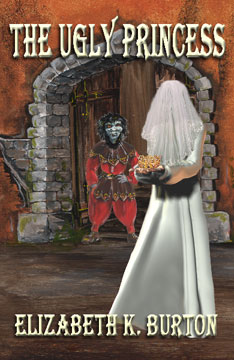 The Ugly Princess
The Ugly Princess
by Elizabeth K. Burton
Published by Zumaya Publications
The only thing wrong with this book is the cover. Blech. (Although the irony is cute.)
But I didn’t beg the author to point me to an e-copy (which she so obligingly sent me in a format I could use, yay customer service!) because or in spite of it. (It’s only currently available in dead-tree version; I expect it’ll show up on Fictionwise soon.)
Here’s the official blurb:
The king is dead, long live the queen!
Well, not if the King of Nadwich and the dead monarch’s three royal ministers have anything to say about it.
It’s up to Sir Christopher Evergild, the Royal Champion, to see that the new queen survives to take her throne—even if she is so ugly she’s been locked away for twenty years with only trolls for company. Chris is prepared to do his duty, even if The Ugly Princess does turn out to be the lunatic she’s always been rumored to be.
What he isn’t ready for is having his entire world turned upside down and inside out—and having to decide between love and the fear that has haunted him most of his life.
This is going to be a short review because, well, I loved everything about it. After speaking with the author, however, I have a feeling she and I share sensibilities in our stories, so take everything I say with that in mind. Or not.
This is a fantasy with sweet romantic elements and I love the sweet stories as much as I love the hawt ones. There is no swearing or sex (oh, maybe a “damn” or “hell” here and there, but I can’t remember). It’s set in the imaginary world of Karlathia, which I envision as a fairy-tale village whose battle technology is a weird mix of firearms and medieval hand-to-hand combat.
It has two narrators (Bertram, the kingdom’s seneschal, and Christopher, its army’s chief general), and is split into first and third person, which I love. In the almost-omniscient first person, the prose is loose and funny, yet cozy because it breaks the fourth wall, yet is more formal and intense (and removed, natch) in third person. Both suit the respective narrators’ personalities very well.
Descriptions as seen through the seneschal’s first-person point of view were sharp:
He [evil monarch] cut his food into tiny bites, chewing each one thoroughly before swallowing. He did not mix the fare on his plate, finishing one item entirely before proceeding to the next.
Those two brief sentences tell me a whole lot about that character.
Bertram’s overstated understatements and asides make me smile and laugh (in fact, I’d go so far as to say he upstages Christopher, but that is not to the story’s detriment):
Going to the aforementioned clothes press, I discovered my host had an exceedingly eclectic wardrobe–everything from complete Court regalia to a set of rags that seemed held together mostly by optimism.
Demtri [idiot nephew of evil monarch], seemingly oblivious to what was happening, sat on the throne with a large bowl of grapes on his lap, tossing them in the air and attempting to catch them in his mouth. His aim was not particularly commendable.
At this point I struggled not to draw my pistol and punctuate Niklaes’s arrogance with a lead period.
It was a very fun and funny read. Bonus! I learned a new word: eldritch.
Liz, give me your Paypal address because I want to pay you for this.
 And I’m only 50 pages in.
And I’m only 50 pages in.
Right now I’m reading The Actor and the Housewife, and I just don’t quite know what to think. Here’s the blurb:
What if you were to meet the number-one person on your laminated list—you know, that list you joke about with your significant other about which five celebrities you’d be allowed to run off with if ever given the chance? And of course since it’ll never happen it doesn’t matter …
Mormon housewife Becky Jack is seven months pregnant with her fourth child when she meets celebrity hearththrob Felix Callahan. Twelve hours, one elevator ride, and one alcohol-free dinner later, something has happened … though nothing has happened.
It isn’t sexual. It isn’t even quite love. But a month later Felix shows up in Salt Lake City to visit and before they know what’s hit them, Felix and Becky are best friends. Really. Becky’s husband is pretty cool about it. Her children roll their eyes. Her neighbors gossip endlessly. But Felix and Becky have something special … something unusual, something completely impossible to sustain. Or is it?
A magical story, The Actor and the Housewife explores what could happen when your not-so-secret celebrity crush walks right into real life and changes everything.
This part is what gets me: “It isn’t sexual.”
My. Ass.
Now, look, Sister Hale. I realize that I shouldn’t be coming to this novel from the perspective of a romance reader, because it’s not a romance. (I know it’s not because the library cataloging block told me it isn’t. It says it’s “chick lit,” and library cataloging blocks don’t lie.) But I am coming to it from a romance reader’s perspective because it’s whispering naughty thing in romance’s ear at this point. Yet I don’t know a die-hard romance reader in the world who wouldn’t tear her hair out.
Becky Jack (the main character) is, thus far, what we romance readers would call TSTL. Too Stupid To Live.
Also? Flirting *kofffallinginlovekoff* with someone while you’re happily married is a HUGE romance no-no.
I had to take a break from the gore of this woman’s squished IQ and blog it. I don’t even know if I’ll be able to finish the book, except …
I must get back to the trainwreck that she is. I should turn my eyes away. Look somewhere else. But I can’t.
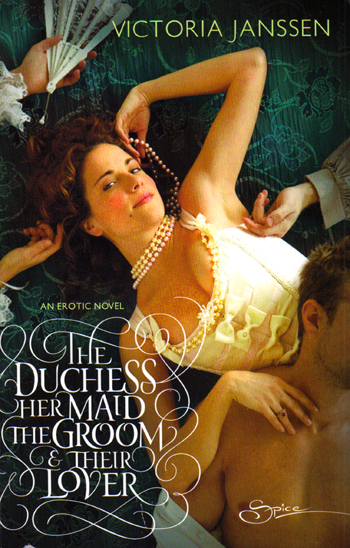 The Duchess, Her Maid, The Groom & Their Lover: An Erotic Novel
The Duchess, Her Maid, The Groom & Their Lover: An Erotic Novel
by Victoria Janssen
Published by Spice
Please note the title and study the cover a bit. Does that say “romance novel” to you? Me, neither.
And yet, despite the absence of the word “Harlequin” anywhere on the cover, on the copyright page, on the “coming attractions” back matter, apparently, Romancelandia thought this was a romance. I don’t know why, unless Romancelandia simply has no history with pure erotica.
There is a difference between romantic erotica and pure erotica (aka could-be-porn-if-that’s-your-definition) and perhaps Ellora’s Cave has just trained Romancelandia to read “romance” or “romantic erotica” where they see “erotic novel” or “erotica.”
I don’t know how this could have been mistaken for a romance.
Moving along. Jessica, over at Racy Romance Reviews, reviewed this and while her review wasn’t necessarily favorable, it was academic (’cause she R 1) and in no way (I thought) insulting. She also admitted that she didn’t have much experience with whatever “pure” erotica really is.
I wanted to read this book, but balked at paying $11.30 for the ELECTRONIC book, so someone took pity on me and sent it to me, requesting that, if possible, I review it because that person was interested in my opinion (though heaven only knows WHY!).
My opinion is that I can’t finish this book.
Why?
The nastiness that went on concerning a liveblogging “review” incident between Dear Author and Smart Bitches (NOT linking). I didn’t read the transcript, so I am not speaking to whether the liveblogging was nasty or not, but the comments on the thread really, really disheartened me. It destroyed any enjoyment I might have gotten out of it and made me want to pick nits where there were no nits to pick.
I read 40% of the book before I simply had to put it down, so I feel very cheated and I’m going to address others’ complaints of the book that apply to what I read and comment on those, then I’ll pick the two very big nits I actually did have.
COMPLAINTS:
 1. Nobody could figure out the setting, but thought it might be somewhere in 17th-18th Century France.
1. Nobody could figure out the setting, but thought it might be somewhere in 17th-18th Century France.
Okay, first, it’s erotica. Have we established this fact? It doesn’t need a setting. It’s a fairy tale and the descriptions were such that I envisioned a Neuschwanstein-type castle.
As long as the descriptions of the castle let you know these characters were amongst lush, and candles were the major source of light, and the clothes were voluminous and bulky, the exact place and time weren’t important.
2. That the sexual situations were totally ridiculous.
3. That Camille’s reasoning for escaping her abusive-cum-murderous husband RIGHT THEN was flimsy.
4. That there just happened to be brothels everywhere along the path they took on their escape route, doubling as inns.
5. There are eunuchs! In a place we think might be 17th-18th Century France. Eunuchs! What the fuck?
STRENGTHS:
I think Jessica summed it up best when she said this:
In some ways, despite the sexual sadism of the Duke, this book offers a very positive view of sex. Sex is the go-to coping strategy for most of life’s problems: Need an heir? Feeling stressed? Husband trying to kill you? Lonely? Bored? Want to show someone you have power over them? Need a place to stay for free? Want to escape those thugs? Need a favor? Want to convince someone to ally with you? Want to thank someone? The answer is sex, sex, sex, sex, and more sex.
That was its strength and its purpose. Why? Because it’s erotica. Have I mentioned that?
Okay, so now that we’ve got all that out of the way, here was my problem with what I read:
NIT ONE:
The cover. Come on. It’s gorgeous, absolutely breathtaking all textured and ripe with hot redhead right there in the center of groping hands and a pearl necklace around her neck (make of that what you will).
Except … Camille is described as having black hair with gray streaks.
FAIL.
NIT TWO, which is the genuine weakness of the book:
The sexual logical inconsistencies. “What?!?!” you cry. “You just finished telling us it was erotica and don’t get hung up on the ridiculousness of it. What could you possibly mean?” Not that way, you silly goose.
1. Camille needs an heir or her husband will kill her. Her husband is shooting blanks. She summons the groom to attempt to impregnate her because any child of his could pass for her husband’s. Okay, so far so good. Sounds like a plan. But immediately after finishing with the groom, she is summoned to her husband’s wannabe de Sade dungeon.
[Her husband] had to fuck her at least once, in case she had managed to become pregnant that afternoon.
Okay. We know she doesn’t want to, but we get the timing issue. But then he doesn’t. And not only does she not worry about this, it doesn’t even occur to her that she missed her chance to cover up her possible switcheroo.
2. Camille’s been married to this dude for 20 years and has been exposed (as a spectator and submissive) to every sexual deviance possible because he’s sick and twisted that way. And yet, this night, the relatively mild antics are … different? And now she’s aroused by them? After 20 years of debauchery? Really? Just now? No, I don’t believe it.
In other circumstances, she might have enjoyed tasting so large a cock, but not in front of the duke.
So … has she or has she not experienced pleasure before? Has she or has she not given head? The implication before this passage is that she had (by force), but at this moment thinks about how delicious it might be if her husband wasn’t watching? Say what? No, I don’t believe it.
I think I would have had a problem with Camille’s contradictory sexual history anyway, but I don’t think it would have made me simply put the book down and not want to pick it up again. The unpleasantness surrounding it combined with that simply destroyed any enjoyment I might have had.
Quite simply, it was a chore to read, which frustrated and disappointed me to no end because it was a book I wanted to read and expected to enjoy.
Since this was given to me, I’d like to pass it along. First person to email me gets it.
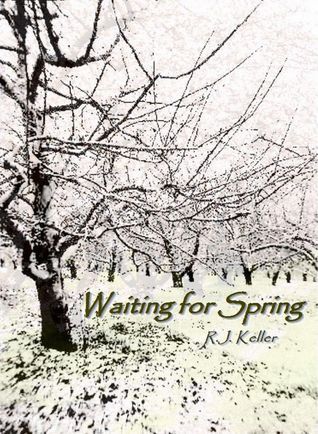 Waiting for Spring
Waiting for Spring
by RJ Keller
It’s been a long time since I threw common sense to the wind and stayed up to finish a book knowing how much I had to do the next day, but not resenting it the next day because it was totally worth it.
This book has no spiffy genre classification. After some thought, I think I’d call it “literary romance.” I don’t know what “women’s fiction” is and I’m not sure I really even know what “chick lit” is, but I’m pretty sure it’s not either of those. And you know, lately, I’ve been very happy with the books that haven’t been easily classified.
Here’s the blurb:
It’s not the kind of pain she can see and smell and wrap with an ace bandage. It’s the kind she tries to numb with sex and work and cleaning-cleaning-cleaning the house. The kind that comes from enduring a lifetime of rejection. First from her mother–whom Tess knows would have aborted her had the law allowed it–then from a string of men whose names she can never remember. And finally, at age thirty-four, from her husband of ten years; the man who once promised to love her forever.
You want angst? I gotcher angst right here, pal. And this is the good stuff, the kind that jerks you around and bashes you over the head and makes you come back for more to see how it all ends. In my experience with literary fiction (one of which was an Oprah pick—sue me), there seems to be some sort of unwritten rule about writing angst, which is to understate it, to let the subtleties of the angst dawn on the reader like a sunrise behind storm clouds.
Problem with that approach is that A) I don’t ever get to know or care about the characters enough to care about their angst and B) their angst isn’t that big of a deal anyway; if the characters clearly don’t care about their angst, why should I? So I’ll read literary fiction, don’t get me wrong, but later, I’ll scratch my head and say (if asked), “Yeah, I think I read that book, but I don’t remember the name or the author.” I just remember dipping my toe in the wading pool of that world once upon a time.
The main character, Tess, has angst and she doesn’t seem to care about her angst, either. But I cared about her angst from the very first paragraph:
They say actions speak louder than words. Maybe. But words do a hell of a lot more damage. Even well-meaning words spoken by well-meaning people.
People like Sister Patricia Mary Theriault. She was my catechism teacher when I was seven years old. Until she ruined my life. [ … ]
Then she told us about the bad soil. [ … ] But the only bad soil I heard about was this:
“As the Sower was scattering the seed, some fell along the path; it was trampled on and–”
Path. Trampled. Bad soil. [ … ]
“Don’t let your hearts become trampled down, children. Keep them soft and fertile so you can feel God’s love inside of you.”
Seven years old. And already I knew I was in some deep shit. The kind that even Sister Patricia couldn’t do anything about.
The twin hyperbolic allegories of “until she ruined my life” and “Seven years old. And already I knew I was in some deep shit” are not, actually, hyperbolic or allegorical, but the reader doesn’t find out why or how until far, far into the book.
You might be tempted to point out that this is simply excellent fiction infrastructure, to which I would say … yeah, I know. But I don’t see that a whole lot anymore. As far as I can tell, the current writing fad is to make me, Random Reader, ask the question and then never let it linger like a good combination of spices on my tongue or let me savor the moment of enlightenment when/if it happens.
Instead, it will ask the question and proceed to answer it for me 2 pages later and sometimes, even worse, will over-explain it in case I didn’t get it fast enough or thoroughly digest all the layers of subtext. I’m very tired of being treated like an idiot in my fiction and, further, I hate that I actually have to call attention to this amazingly annoying trend.
There are quite a few laugh-out-loud lines, sharp. Wry.
When Tess, age 34, takes Brian, age 25, as a lover, they finish, talk, then begin again not long after. Tess observes,
Ready again. Twenty-five. Gotta love that.
Keller also gives the reader glimpses of the spirituality that’s woven all through the tale; they glimmer, like the gold threads in shot fabric:
The stars, he said, were actually souls; all the souls that were too restless to be locked up in heaven. They were so restless that God let them stay outside at night to play.
And when an 8-year-old girl about to take her first communion asks Tess if she believes in God, Tess says:
“Yes, I believe in God. I just … I don’t feel close to him in church.”
“Really? Why’s that?”
I shrugged, even though I knew exactly why. I knew because I’d felt that way since I was a little girl, sitting in my church clothes, listening to the Mass. Trying to feel His presence. Struggling to feel His love. But there was nothing there. Nothing but words I didn’t completely understand and scary status. And then, one beautiful Sunday Spring morning when I was nine years old, something occurred to me. Something I never told anyone else.
He’s not really in here. God doesn’t live inside a building, and that’s all a church is; just a building filled with lots of words. [ … ]
Because Anne [of Green Gables] said that if she really wanted to talk to God, a real true prayer, then she’d have to go outside to do it. She’s need to surround herself with God’s creation, with His beauty; drink it in and let it fill her up. And then she could look heavenward and just feel a prayer.
The narrative itself is choppy, with sentences and paragraphs written in fits and starts, which perfectly mirrors Tess’s personality and her coping mechanisms (particularly her “personality disorder”). In fact, a good portion of Tess’s internal dialog and her observations are written as wry asides to herself and she is inviting you, Random Reader, to chuckle along with her.
And I did. Even while I had tears running down my cheeks.
Kept
by Zoe Winters
published by IncuBooks
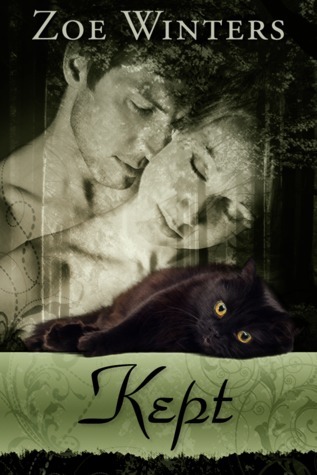 Zoe is an independent publisher I “met” by happenstance when I got soundly thrashed on Dear Author for suggesting that a multi-published author whose 3-book SERIES contract had been canceled after book 2 (leaving her fans out in the cold with characters they loved) actually self-publish the third book in the series (you know, since her rights had reverted back to her and she already has a fan base salivating for it). Good gravy, you’d’a thunk I’d said the Rapture was coming tomorrow and they’d all be left behind and have 666 burned into their foreheads bwahahahahaha burn in hell losers.
Zoe is an independent publisher I “met” by happenstance when I got soundly thrashed on Dear Author for suggesting that a multi-published author whose 3-book SERIES contract had been canceled after book 2 (leaving her fans out in the cold with characters they loved) actually self-publish the third book in the series (you know, since her rights had reverted back to her and she already has a fan base salivating for it). Good gravy, you’d’a thunk I’d said the Rapture was coming tomorrow and they’d all be left behind and have 666 burned into their foreheads bwahahahahaha burn in hell losers.
Anyhoo, as Bob Ross would say, it was a happy accident.
Kept is a free novella you can find at her site (link above) in PDF form. You can find it at Amazon in Kindle for 80¢ and you can find it on Smashwords in various formats for those of us who bitch if we don’t get it the way we want it. Somebody call me a waaaaahmbulance.
And really, “free” is my second-favorite four-letter f-word.
Here’s the blurb:
Greta is a werecat whose tribe plans to sacrifice her during the next full moon. Her only hope for survival is Dayne, a sorcerer who once massacred most of the tribe. What’s that thing they say about the enemy of your enemy?
Now, I don’t do much paranormal and I really don’t like shapeshifters, but throw the word “sorcerer” or “wizard” or “warlock” at me and I’ll take a second look. And I’m glad I did.
Beefs first:
The story was a little choppy in moments of transition, but I’ve seen that so much lately that it doesn’t bother me as much as it used to and, I’m guessing, readers are being taught to get used to it and, by extension, writers are doing it more.
Also, the story could’ve been longer with more explanation of the world. I (Random Reader who likes really really really long books) would have liked that. Let me get you some salt for that opinion.
Good stuff:
What glimpses of their world I got, I liked. I could tell it wasn’t a half-assed world half-thunk-up on the fly, and that it had depth and detail underneath. (Repeat: wanted more.)
I really enjoyed the hero’s crankiness and the fact that he was “old” (how old we’re not told, but I inferred around a century). I liked that when the hero and heroine had sex pretty nearly upfront it was because of species-specific hormone issues (i.e., cat in heat) that she usually controls with medicine, but didn’t have her medicine with her.
I laughed a lot through this book. The banter is witty and cute, seems natural to both of them, and gave the characters the depth that natural humor brings to people.
The cover’s pretty and the interior design is good. In short, it’s right up there with a lot of the novellas in the anthologies by traditional publishers that are on bookstore shelves and much better than a lot of other stuff I’ve read lately from the e-presses that I paid for. I enjoyed myself.
Coulda been longer. Did I say that?
So. If you get it from Smashwords, leave a tip, okay?
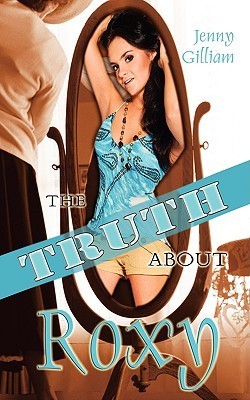 The Truth About Roxy
The Truth About Roxy
by Jenny Gilliam
published by The Wild Rose Press
I like the longer single-title contemporary romance (no suspense, thanks, and the category lengths are just way too short) and lately, the ones I really like have been coming out of the smaller e-presses. They’re not as well edited as I’d like, but they’re fun reads whose story lines seem to stick with me quite a while.
The Truth About Roxy was a light, fun read that still managed to make me laugh and cry. I’ve read another of this author’s non-suspense novels (Letting Luce) and it was just as light and fun. Even I, lover of all alpha heroes monied, adore that Jenny’s characters are normal people like me, with normal-people jobs and normal-people problems.
Here’s the blurb:
Roxy Palmer is a walking, breathing cliché. And darned tired of it. Working as the assistant librarian in her small, Southern home town, Roxy also anonymously pens the local love column, ASK PAULA ROCKWELL—Thorton, Georgia’s answer to Dear Abby. But when the door leading to Roxy’s lifetime dream is slammed in her face by one of the good ol’ boys, Roxy brings out the big guns—and turns the genteel town upside down with her racier, feminist, home-wrecking new format. Paula Rockwell is making Sheriff Noah Kennedy’s life crazy. He’s got angry husbands lined around the block, demanding the cancellation of the column, fights breaking out and women catching their boyfriends’ trucks on fire. If he ever gets his hands on that woman… But he’s got his hands FULL of Roxy at the moment, and if he ever discovers the truth about Roxy, all hell will break loose.
Beefs first:
I thought Noah’s extreme reaction to Roxy’s coming-out (as it were) was too much, because he’d known her all his life and he should’ve understood her better.
And oh, that cover, bless their hearts. [Insert longsuffering sigh here.]
Good stuff:
Again, fun, light romp. The characters were engaging and I believed in the nutjobs and the goofy backwater Southern town because they were drawn so vividly.
I had a really good time with this book, and that’s all I care about.
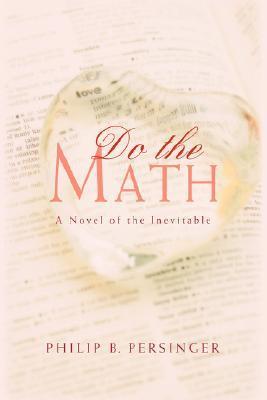 Do the Math
Do the Math
by Philip B. Persinger 💔
published by iUniverse
I read a review of this book that pissed me off, but the blurb looked interesting and so I went forth to iUniverse (yes, it’s independently published) to purchase the ebook. I will spare you the nightmare of actually getting the book, but iUniverse? Bite me. Fortunately, the author came through for me when I copied him on my bitchmail to iUniverse (which they still haven’t responded to). Anyway, he got me a print copy of his book posthaste and so I was a fan on that basis alone.
Here’s the blurb:
What could be worse than losing the love of your life? Getting her back!
William Teale is a brilliant professor of mathematics. His theory of inevitability posits that any human action, no matter how insignificant, might result in a disproportionately huge calamity.
His wife, Virginia “Faye” Warner, is a world-famous romance novelist who specializes in reuniting soul mates after a tragic and prolonged separation. According to her math, “one past and two hearts plus one love equals four-ever.” The Teale-Warner marriage is a thing of geometric and artistic perfection, a melding of the heart and the brain-amour and algebra.
But when Faye’s ghostwriter suffers a nervous breakdown and shakes all the arrows out of Cupid’s quiver, Faye reintroduces her husband to love. Unfortunately, it’s not with herself, but with the woman William had loved and lost years ago. Love is about to clash with inevitability, and it’s unclear which will emerge victorious.
Told in the off-beat voice of William’s graduate intern, Roger, Do the Math reveals the curious relationship between logic and love and the delightful consequences of taking a chance.
Only one bad point and it’s technical: The funky paragraph breaks in dialog. Oh, I don’t mean the looooong monologues that have to be broken, but, for example:
“Her home away from home,” he answered. “Room 407. New Coventry Medical Center. Only the best.”
“By the way,” he added as he picked up Claire’s drink and toasted me with it. “You did very well tonight, Roger.”
That unnecessary split happened enough that it was annoying, but certainly not enough to diminish the overall fantasticity of this novel. If you ever needed a posterbook for the validity of self-publishing, this is it.
And one aside, which I don’t know if it was tongue-in-cheek or not. A vague reference is made to the movie Poltergeist, but the story is set in 1978 and that movie didn’t come out until 1982. I could see how that could go either way, so I’m giving the author the benefit of the doubt.
This is the story of 50-year-old professor of mathematics William Teale and Virginia, his romance-novel-writer wife and Claire, Teale’s lost love from 25 years ago. It’s told from the point of view of his 25-year-old intern, Roger, in first person. And oh, it takes place in 1978. Did I say that already?
This book’s kinda sorta billed as a romance. I think. I’m not really sure. And I don’t really know what it is anyway except hilarious. I know it’s supposed to be poignant and bittersweet. I know it’s supposed to be about Teale’s relationship with his wife and his lost love. Really, I do know that.
But what you have to know going in is that I have an eccentric sense of humor and a wee bit of a crush on higher math. Can’t add or subtract without a calculator (multiplication and long division are simply out of the question) and I really just don’t care for discrete math much, but after some struggle and time, I’m a fair hand at simpler calculus. It’s like the bad boy you just want to take home and try to tame.
Okay, so what that’s got to do with the price of tea in China is this: If you don’t get the math jokes, it’s okay. It’s still funny. If you do, it’s ROFLMAO funny. The author conflates mathematics and romance in such a bizarre way I can’t help but chortle just thinking about it. For instance, Teale tries to figure out what to do about his problem using set theory in a discussion with Roger:
“It’s about balancing the quality of the empty set against one with two elements,” I started out. “That just doesn’t make sense.”
“No, it doesn’t,” he said.
Relieved by that concession, I followed up.
“Then how can a set of two elements be qualitatively equivalent to an empty set?”
He smiled wearily. “Unexplored territory, isn’t it?”
He thought a moment longer. “It’s the wasteland,” he said. “We understand the null set. There’s nothing there. But a set of two elements which has no connection, or, if connected, no contiguousness, that is, ultimately a set that is in and of itself empty, isn’t it?”
In other words, using set theory, Teale equates his relationship with his wife (two elements in one set that are disconnected) to a set with nothing in it.
All the little oddball characters that populate a college campus/faculty/town are fondly drawn and you can immediately find the equivalents of these people in the memories of your own college experience. All the subplots come together nicely in one tight, tidy little knot at the end (although I’ll admit I knew where one of them was going on page 23, and sure enough).
Now, about that “romance novels are just a formula” business: That is repeated ad nauseam throughout the tale, but funny enough, even though they spend valuable computer time (vacuum tubes! keypunch cards!) trying to figure it out, they read from a how-to-write-romance manual and follow it strictly, and yet … they never manage to figure it out, disproving their own premise that there’s a real formula to it.
I had no problem with this facet for three reasons: (1) Though all the characters (including the romance novel writer and her ghostwriter) think this, it doesn’t seem to be thought of as a bad thing; it’s simply a fact of their life and needs to be adhered to as any other product specification, as they’re up against a deadline, and (2) This is set in 1978, remember. The specifications outlined are, to the best of my recollection, exactly how romances were written in the late ’70s, so I can’t really go throwing stones at fact (or at least my perception of fact), and (3) For all the “formula” talk, it was still respectful of the genre and its fans.
Some passages that made me howl (and wake up the Tax Deducations) got their pages dog-eared. (The horrors!) Examples (although I must warn you that my sense of humor is a bit, ah, weird, and these are somewhat out of context so they might not translate):
[Sample from a technical writer for a nuclear reactor handbook applying for the job of a romance novelist ghostwriter]:
“ … pump type can be determined by identifying flange at top of housing. Inductive cooling pump has a rigid pressure release vent hanging down perpendicularly on flange centerline. Whereas action release coil pump is unique because of the two nipples protruding from either side directly above the emergency bleed valve.”
and
“A warning. The manifold might be hot. Use caution when sliding the spanner between the opened blades, as there is a danger of electrical arcing … It might be necessary to remove the probe from the main sheath and reinsert with proper lubrication … If vibration continues, apply appropriate torque to the uppermost junction point until release is achieved … ”
[Romance novelist] closed the booklet with a rude snap.
“There has been a terrible misunderstanding here.”
“I’m sorry?” said Claire.
“This seems so—how should I put it? Technical.”
Even though it is in no real way similar, it vaguely reminded me of Neal Stephenson’s The Big U. Loved the premise, loved the voice, loved the characters and the humor is dry enough to make you beg for water.
And, oh, the author didn’t assume the reader would be 5 and need everything explained.
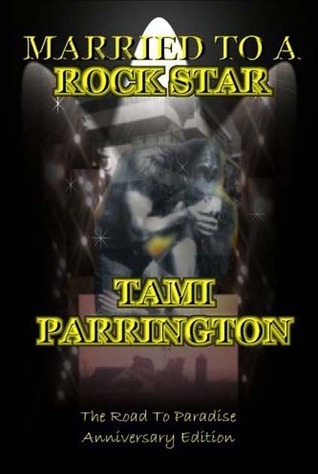 Married to a Rock Star
Married to a Rock Star
by Tami Parrington
published by Prairieview Publishing via Lulu
I read a great review of this book and went immediately forthwith to purchase it. I don’t know whether I’m more upset with the book or with the review, but let’s just say this would’ve been a wallbanger had it not been on my precious ebook reader. I shouldn’t have finished it, really, but I kept reading because I thought surely, somewhere along the way, the heroine would pull her head out of her ass.
Alas.
I wanted to like this book. Really. I thought I would like this book because of the real-life fantasy of it (as in, not elf- fairy- magick-type fantasy). It’s independently published and I want and need to support that community. Thus, I’ve been sitting on this review for several days, thinking about whether I wanted to post it or not.
Here’s the summary:
Out in the country, Karen and her two teenage children have a new neighbor-Isaiah Highland, who is anything but the farm type. Isaiah is a rock-star looking for peace, starving for privacy, and he’s found them both … and a whole lot more. Swept into a world of fame, fortune, and betrayal, Karen finds herself in a world far removed from her little farm.
Two separate worlds …
Worlds bound to collide …
When they do Isaiah and Karen will have to choose between their own versions of paradise … and each other.
Good points:
Bad points:

And you know, I could’ve gone with it and had snarkworthy fun with it had not children (impressionable teenagers, yet) been involved in her rapid and willing debasement. For that, I felt dirty after reading this book and I finished it wondering if the reviewer (whose recommendation I took) and I read the same book.
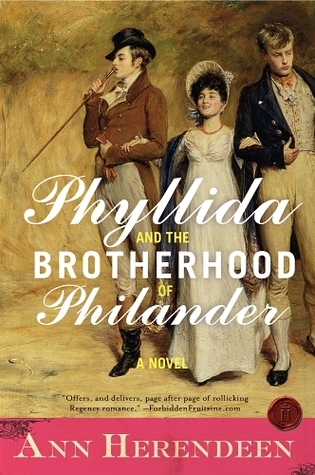 Phyllida and the Brotherhood of Philander
Phyllida and the Brotherhood of Philander
by Ann Herendeen
published by Harper Paperbacks
This book, whose tagline is “A man in love with his wife and his boyfriend,” wouldn’t normally catch my eye because m/m isn’t my kink. I bought it for an entirely different reason. So now that I bought it and read it and thoroughly enjoyed myself (oooh, have you noticed this trend about what I review?), I must speak my piece.
Here we are in Regency England (and those of us in Romancelandia are more or less completely and totally comfortable in Regency England, Heyer or no Heyer) and a sodomite wishes to marry to fulfill his duty to his family name while still continuing his unabashed lifestyle. He finds the right chick, marries her, figures out he so really doesn’t mind doing her, thinks she’s refreshing and falls in love with her blahblahblah (yeah, you know how it goes), then meets the male love of his life and we all end up happily ever after in the same bed with nary a menage a trois to be had. Of course, what would a Regency romance be without a little spying here and there?
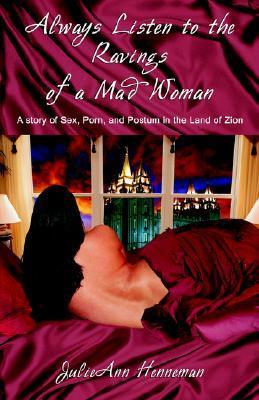 Always Listen to the Ravings of a Mad Woman
Always Listen to the Ravings of a Mad Woman
(A Story of Sex, Porn, and Postum in the Land of Zion)
by JulieAnn Henneman
published by Draumr Publishing
This book was mentioned to me as something different (especially as regards Mormon characters), so I went a-seeking. And boy, did I get.
Corinne Young is having an affair with her dentist. Kinda. Sorta. She’s not sure why, but there’s gotta be a reason, right? Her husband, Brent, holes himself up in his office with his computer all night long, working on the software training company he built. And then, well, all hell breaks loose. It doesn’t take long to understand why Corinne’s diddling the dentist, even if it takes her longer than the reader to figure it out. (Because, well, what does “husband holed up in his office with his computer all night long” say to you? Okay, after much thought, it occurred to me he could have been gaming.)
 In my opinion, this is not so much a twisted fairy tale as an example of how to write. I won’t get into all the gush-deconstruction with various adjectives and superlatives because it’s been done ad nauseam (by an agent, even!)
In my opinion, this is not so much a twisted fairy tale as an example of how to write. I won’t get into all the gush-deconstruction with various adjectives and superlatives because it’s been done ad nauseam (by an agent, even!)
Bettie, if you see, this, please email me your Paypal account and I’ll PAY you for the privilege of having read it.
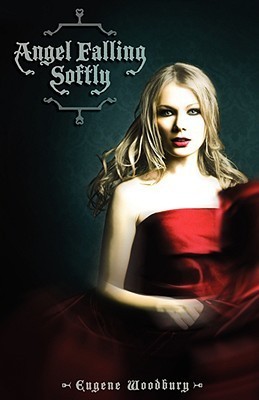 Angel Falling Softly
Angel Falling Softly
by Eugene Woodbury
published by Zarahemla Books
Perhaps I should admit upfront that I consider myself an undemanding reader. I’ll happily go wherever the author wants to take me as long as it’s logical, consistent, and interesting. Let me add that I don’t even particularly care whether a story is plot-driven or character-driven; give me something to chaw on intellectually and I’m good to go. Make me laugh and I’ll forgive almost anything.
This is one reason why, when I read Stephenie Meyer’s Twilight, I was highly annoyed [private link]. I like vampires. I’ve studied vampire myths since I fell in love with Vlad the Impaler somewhere in the early ’90s, so her inconsistent worldbuilding, her habit of telling rather than showing, and her mostly flat characterizations grated.
By contrast, Eugene Woodbury’s take is haunting. Poignant, even.